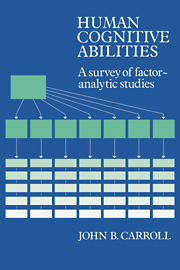Book contents
- Frontmatter
- Contents
- Preface
- PART I INTRODUCTION TO THE SURVEY
- PART II THE IDENTIFICATION AND DESCRIPTION OF COGNITIVE ABILITIES
- Chapter 5 Abilities in the Domain of Language
- Chapter 6 Abilities in the Domain of Reasoning
- Chapter 7 Abilities in the Domain of Memory and Learning
- Chapter 8 Abilities in the Domain of Visual Perception
- Chapter 9 Abilities in the Domain of Auditory Reception
- Chapter 10 Abilities in the Domain of Idea Production
- Chapter 11 Abilities in the Domain of Cognitive Speed
- Chapter 12 Abilities in the Domain of Knowledge and Achievement
- Chapter 13 Psychomotor Abilities
- Chapter 14 Miscellaneous Domains of Ability and Personal Characteristics
- Chapter 15 Higher-Order Factors of Cognitive Ability
- PART III ISSUES
- References and List of Datasets
- Appendix A Codes for Countries, Samples, and Factors
- Appendix B Hierarchical Factor Matrix Files
- Name Index
- Subject Index
Chapter 13 - Psychomotor Abilities
Published online by Cambridge University Press: 29 September 2009
- Frontmatter
- Contents
- Preface
- PART I INTRODUCTION TO THE SURVEY
- PART II THE IDENTIFICATION AND DESCRIPTION OF COGNITIVE ABILITIES
- Chapter 5 Abilities in the Domain of Language
- Chapter 6 Abilities in the Domain of Reasoning
- Chapter 7 Abilities in the Domain of Memory and Learning
- Chapter 8 Abilities in the Domain of Visual Perception
- Chapter 9 Abilities in the Domain of Auditory Reception
- Chapter 10 Abilities in the Domain of Idea Production
- Chapter 11 Abilities in the Domain of Cognitive Speed
- Chapter 12 Abilities in the Domain of Knowledge and Achievement
- Chapter 13 Psychomotor Abilities
- Chapter 14 Miscellaneous Domains of Ability and Personal Characteristics
- Chapter 15 Higher-Order Factors of Cognitive Ability
- PART III ISSUES
- References and List of Datasets
- Appendix A Codes for Countries, Samples, and Factors
- Appendix B Hierarchical Factor Matrix Files
- Name Index
- Subject Index
Summary
… sharp distinctions between verbal and motor processes, or between cognitive and motor processes serve no useful purpose.
Paul M. Fitts (1964)My survey of cognitive abilities was not intended to cover the domain of physical and psychomotor abilities, but many of the datasets included measures of psychomotor abilities, with the result that a number of interpretable factors in this domain appeared. The first section of this brief chapter presents, without extensive comment or discussion, a classified list of those factors in this group that appear to match factors that have been covered in previous literature surveys. In the second section, there is presentation and discussion of certain psychomotor factors that appear not to have been well recognized in previous surveys, or that seem particularly relevant in considering the measurement of cognitive abilities.
PHYSICAL AND PSYCHOMOTOR ABILITIES COVERED IN PREVIOUS SURVEYS
Fleishman (1964,1972; see also Fleishman & Quaintance, 1984) has summarized the results of research by himself and others on dimensions of physical and psychomotor abilities. A further summarization of these results is to be found in a chapter by Peterson and Bownas (1982), who list and describe, in their Figure 3.1, eighteen psychomotor and physical proficiency abilities identified by Theologus, Romashko, and Fleishman (1973); brief information on measures of these abilities is given in a section of their Figure 3.3. Using this information, I have attempted to classify, in Table 13.1, relevant factors yielded by my datasets.
- Type
- Chapter
- Information
- Human Cognitive AbilitiesA Survey of Factor-Analytic Studies, pp. 532 - 541Publisher: Cambridge University PressPrint publication year: 1993



